Nicholas Schmidle: The Army Comes to the Rescue
Kamal Hossain, like millions of others around the country, is ecstatic. A well-dressed man in his early 70s, with a deep, throaty voice, Hossain sounded triumphant and giddy during our recent meeting. "People are shocked, because suddenly the law has returned to Bangladesh," he said. He thinks that if Yunus can leverage his public stature and stay committed to clean, principled politics, he could "fuel a real democratic movement." Thirty-five years ago, Hossain played a critical role in the movement to form Bangladesh, acting first as legal adviser to "father of the nation" Sheik Mujibur Rahman and later writing the 1972 constitution. But 30 years later, he found his nation's prospects growing grim. Yunus' candidacy, Hossain says, is proof that, "God exists for Bangladesh."
But is serious change truly under way? And can the army take credit?
Bangladesh is a Muslim-majority country of roughly 145 million people whose army has a history of meddling in politics. In 1975, a handful of army officers assassinated Mujib, as Mujibur Rahman was affectionately known, and his family. That touched off a rapid series of coups and countercoups. Gen. Ziaur Rahman, who ruled from 1975 through 1981, survived 22 coup attempts before finally being assassinated. Five separate military regimes ruled from the time of Mujib's murder until December 1990, when massive street demonstrations forced Gen. Mohammad Ershad, who had seized power in a 1982 coup, to step down and hand power to a civilian government.
During the three elections since 1991, the army remained in its barracks. Many considered Bangladesh a model for other burgeoning Muslim democracies. Its parliamentary system placed real power in the hands of an elected prime minister, who appoints a president whose powers are limited. The United States Institute of Peace published a report in May 2005 that compared Bangladesh to Turkey and added that it "exemplifies the coexistence of Islam and democracy." But regular elections and a functioning democracy are not the same. During this period of civilian rule, the heads of the two main political parties, Sheik Hasina of the Awami League and Khaleda Zia of the Bangladeshi Nationalist Party, fought out one of the world's nastiest personal rivalries. They competed with each other in everything, including the amount of money they could plunder from the state. Transparency International, the corruption watchdog, ranked Bangladesh as the most corrupt nation in the world five out of the last six years. Meanwhile, the World Bank estimates that the average person makes $470 a year.
Throughout the 1990s and the first seven years of this decade, the army sat back and watched. It had secured a sweet peacekeeping mandate with the United Nations, whereby its soldiers serve one-year postings in places like the Congo, Sierra Leone, and East Timor. In return, the annual salaries of the soldiers increased five- or six-fold. The army didn't want to see their lucrative agreement with the Unites Nations jeopardized as a result of any reckless adventurism, i.e., a coup. But growing tensions and violence throughout the country in late 2006 pushed the generals' patience to the limit.
The trouble started in October 2006, when the outgoing BNP government handed power to a caretaker administration full of BNP sympathizers. In protest, the AL orchestrated demonstrations, strikes, and blockades, during which 40 people died and hundreds were injured. As the elections neared, the frequency and intensity of the street battles intensified. On Jan. 3, the AL announced that it was boycotting the polls. This prompted the International Republican Institute and the National Democratic Institute, two election-monitoring organizations, to cancel their programs, since polls without one of the two major parties could never be considered free or fair. As street violence increased, the United Nations hinted to the army that its inability to keep peace in Bangladesh was threatening its peacekeeping mandate overseas.
I arrived on Jan. 13, two days after President Iajuddin Ahmed declared the state of emergency. No one really knew what to think. Had the army staged a coup? Was martial law coming next? On my first night in Dhaka, I met a young couple at an upscale cafe near the center of town. They hadn't left their house for the previous two weeks, guarding against the off-chance that they would be caught someplace where protesters might be chucking bricks at the police. They were thrilled about the state of emergency. The roads were safe, and they could get their cappuccinos again. Already, rumors were circulating about Yunus taking a political role, perhaps as president or chief adviser to the caretaker government. When I asked the cappuccino couple what they thought, the woman nodded her head approvingly and said, "This country could use some new people." By the time I left a month later, Yunus had officially announced the formation of his party, Nagorik Shakti, or Citizen's Power. He talked about saving the country and rescuing the poor. I knew that the cafe crowd and the elite loved him, but what about the poor?
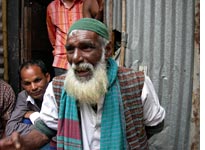 "I spilled blood for this country because I believed that the poor would live freely, but we are still being harassed," said Mohammad Abdul Mohammad Abdul is a 77-year-old slum dweller with a long white beard, stained at the tips like the mustache of a two-pack-a-day-smoker. On the day we met, he wore a green, crocheted prayer cap and a button on his left breast pocket to commemorate his service as a freedom fighter in the 1971 war, when Bangladesh, formerly known as East Pakistan, seceded from Pakistan and fought a gruesome nine-month war that left roughly 3 million people dead. He stood in front of his home—a tin shack suspended by a few knobby-kneed bamboo poles above stagnant water, rotting celery stalks, and shimmering pieces of plastic chip bags—and explained that he was about to be evicted.
"I spilled blood for this country because I believed that the poor would live freely, but we are still being harassed," said Mohammad Abdul Mohammad Abdul is a 77-year-old slum dweller with a long white beard, stained at the tips like the mustache of a two-pack-a-day-smoker. On the day we met, he wore a green, crocheted prayer cap and a button on his left breast pocket to commemorate his service as a freedom fighter in the 1971 war, when Bangladesh, formerly known as East Pakistan, seceded from Pakistan and fought a gruesome nine-month war that left roughly 3 million people dead. He stood in front of his home—a tin shack suspended by a few knobby-kneed bamboo poles above stagnant water, rotting celery stalks, and shimmering pieces of plastic chip bags—and explained that he was about to be evicted.
As part of the its anti-corruption and anti-lawlessness campaign, the army was working in conjunction with police units and detachments of the elite anti-crime force known as Rapid Action Battalion to demolish numerous settlements that were deemed to be illegally encroaching on government property. Three days before my visit, RAB was in the Karwan Bazar slum to give Abdul a three-day notice to quit. "I spilled blood for this country because I believed that the poor would live freely, but we are still being harassed," he told me, exposing a mouthful of teeth the size of dominoes, the result of an aggressively receding gum line.
I expected him to continue berating the joint forces for their plans to demolish his home. But in fact, he was sanguine. He granted that he had no place to go and would probably wind up "roaming the streets," but he didn't blame the army. They are doing the right thing, he said. "These crooks must be arrested."
It wasn't until I brought up Yunus that he became animated. When I asked Abdul if he would consider supporting Yunus in the next election, he sucked on his huge choppers and pretended to swat at invisible flies. Microcredit is one thing, he explained, but running for prime minister is quite another. "Yunus was fine before winning the peace prize," he said. He stuck to what he knew best. "But he doesn't know what he is talking about when it comes to politics. He is just talking."
Refugees or Rebels?
Posted Tuesday, April 17, 2007, at 7:23 AM ET
Nurul Haq hasn't been sleeping at home. In the middle of the night, he slips away from his wife, tiptoes out of the house, and lays on the muddy bank of the Naf River. Every night of the last week, Bangladeshi police and army personnel have stormed his refugee camp in search of criminals—or any able-bodied male with the capacity to act as one—as part of a nationwide anti-crime and anti-corruption campaign. Nurul, a gaunt man in his early 20s who wears a trimmed mustache and a floppy hairstyle, claims that dozens have already disappeared. To avoid arrest, most of the men hide in the jungle. When I asked Nurul why he opts for the riverbank, which seemed to provide less cover, he answered frankly: "I am terrified of the elephants." (Wild elephants roaming the dense hills along the Bangladeshi-Burmese border impale, maul, or stomp to death at least 20 locals every year.)
Nurul is a Rohingya, an outcast community of Muslims from Rakhine state in western Burma (officially known as Myanmar). Burma's military government considers Rohingyas to be migrants from Bangladesh, since they moved to Burma only in the last few centuries, and it refuses to grant them citizenship rights. "They are treated like dogs," an official from the U.N. High Commissioner for Refugees told me. Under "nationality and religion," their national ID cards read "Bengali Muslims." The junta disparages Rohingyan religious and cultural traditions at every opportunity. Most mosques stand in disrepair. Those in passing condition are turned into police and fire stations. Rohingyas who wish to marry must obtain official permission and pay a whopping tax. If the Burmese authorities find out that a couple has evaded payment, the groom is sent off to a labor camp for several years until he works off his "debt."
30 to 40 percent of Rohingyan children in the Teknaf camp are estimated to have respiratory infections
In 1992, 250,000 Rohingya refugees crossed into Bangladesh after rumors circulated that the Burmese army was torching Rohingya villages. UNHCR immediately established 22 camps from Cox's Bazar, a resort city that boasts the longest natural beach—at 75 miles—in the world, to Teknaf, the southernmost city on the Bangladeshi mainland and a renowned hub of smuggling activity. Since then, most of the refugees have returned to Burma, and only two official UNHCR camps remain, housing 26,000 people. But there is also an unofficial camp just north of Teknaf that is home to some 10,000 refugees—commonly referred to as the "makeshift camp." Opportunities for work are scant; Nurul pulls a rickshaw a few days a week and fills the rest of his time as a fisherman. Neither pays more than a dollar a day. Burma's government asserts that rebel fighters belonging to the Rohingya Solidarity Organization operate and recruit there. Others allege that international jihadist outfits poach from the ranks of desperate refugees.
I rented a microbus and went to Teknaf to see the makeshift camp. The road from Cox's Bazar to Teknaf crosses through one of the most conservative areas in Bangladesh. Madrassas, or Islamic seminaries, appeared every few miles on either side of the road. The few women on the streets wore black burqas that cloaked their faces. From a distance, it was difficult to tell which direction they were heading. Lush hills, like giant green gumdrops, formed the landscape to the west. The unimaginably wide Naf River, the natural barrier between Burma and Bangladesh, formed the other. I was marveling at the natural beauty when we arrived at the camp.
A boy cries and leans on his mother while she separates rice in front of their hut in Teknaf
At first glance, the makeshift camp looked like a burlap city, hut after hut made of floppy brown material. But it wasn't burlap or canvas, it was tarps and patches of plastic garbage bags caked with dust. Along the roadside, sections of homemade bamboo lattice pretended to act as a fence. Yet the refugees spilled across the street. Naked children with dripping noses and medicine-ball bellies chased one another back and forth through traffic. Nurul sent someone from the hut he shared with his teenage wife and another couple to bring tea, while his 2-year-old son stood by his side. The boy was naked and snot dripped onto his lower lip. (Doctors Without Borders, which runs a clinic across the street, estimates that 30 percent to 40 percent of the kids have respiratory infections.) He played with his penis the entire time.
The Rohingya camps are filled with disease. More debatable is whether criminals infest the camps. In one of the UNHCR camps, a Bangladeshi security officer explained that almost every male was involved in muggings and thievery, if not worse crimes. I couldn't gauge the veracity of such claims. On the one hand, no one would know better than the man in charge of security for the camp; on the other, Bangladeshi officials exaggerate the Rohingyas criminal activities in order to expedite their repatriation to Burma. The government accuses them of being terrorists. The Dhaka-based Daily Star reported in August 2006 that, "Jama'atul Mujahideen Bangladesh"—the group responsible for detonating 500 bombs simultaneously throughout Bangladesh in August 2005—"emerged with its militant activities by sending trained Muslim Rohingya rebels to Afghanistan and Kashmir war fronts in the 1980s." When I asked Nurul whether he had witnessed recruitment in the camp, he first denied hearing about any such things. Then he spoke up: "Last year, 15 people suddenly disappeared and went off to get military training in the hills. When they came back, we asked them where they had gone. They said, 'We went for the greater benefit of the Rohingya people.' " Nurul said he didn't know the name of the group that offered the training, but he assumed it was RSO. The fresh recruits told Nurul that they were "preparing to fight for the liberation of Myanmar."
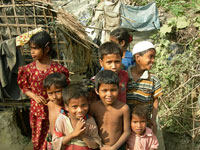 Rohingyan children from Burma in the Teknaf camp
Rohingyan children from Burma in the Teknaf camp
Until then, the Rohingyas will keep squatting in their squalid camps, grateful for every day they aren't arrested, evicted, or forcibly repatriated. The UNHCR camps aren't accepting new refugees, and the Rohingyas believe that the Bangladeshi government is looking for any excuse to deport them. For a long time, they've had no place to call home. Now, with a state of emergency declared in Bangladesh and the army being given more leeway to chase criminals and "cleanse society of unwanted elements," the Rohingyas fear a more aggressive campaign against them may be in the offing.
If people like Nurul returned to Burma, the military would kill them before long. The Burmese army keeps track of the Rohingyas in Rakhine state by conducting unannounced head counts. Those who are absent are considered rebels. According to Nurul, one of the army's preferred methods for punishing traitors is to bind them to a pole under a low tin roof in the sun and then leave them to bake to death. Nurul came to Bangladesh for the first time nearly 10 years ago, holding in his hand a 20-day work token for which he had paid a Bangladeshi border guard a few hundred taka—or around $5. (The Burmese border guards make no effort to keep the Rohingyas from leaving.) When Nurul returned to the border area after his token expired, a fellow Rohingya warned him that roll call had been done. He was listed as missing. He immediately turned around and has been in Bangladesh ever since.
I put a question to Nurul and the other people who had joined us in the hut: Could you ever return to Burma under the current government?
An old man who had recently arrived in Bangladesh spoke up. He said he was cheering for leaders like Aung San Suu Kyi, the Nobel laureate whom the military junta has kept under house arrest since 1989, and desperately wanted to see democracy in his home country. Only then could he consider returning. But being a Rohingya has made him skeptical of all governments. "It doesn't matter who is in power," he said, "If I see cops in the road, I have to run and hide in the forest."
Late in the afternoon, I said goodbye to Nurul. His son gave me a high-five with his penis-twiddling hand. Just outside the hut, another toddler sent an arching stream of urine into a pool of stagnant water, on the other side of which a woman was washing her hair. Teenage girls carried bundles of sticks on their heads, and the glow of the setting sun filled the alleys of the camp. In a few hours, it would be dark, and the army would come looking for criminals. With luck, Nurul would once again tiptoe out of his house to go sleep in the muck along the side of the Naf River.
Among the Missionaries
Posted Wednesday, April 18, 2007, at 7:17 AM ET
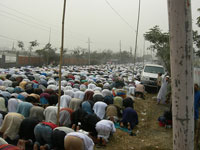 Worshippers during juma, or Friday prayers at the Bishwa Ijetma
Worshippers during juma, or Friday prayers at the Bishwa Ijetma
The Bishwa Ijtema is no place for homophobes. Of the 3 million Muslims who attended the gathering in early February, about 10 were women. Guys walked the grounds decked out in a variety of man-dresses—the Bangladeshis in their traditional, plaid man-skirts; the Arabs in ankle-length tunics; and the Pakistanis in slightly shorter tunics, paired with the sort of baggy trousers that would make MC Hammer envious. I've worn each outfit and can confidently say that none of the 3 million was wearing underwear. Men strolled hand-in-hand while others sat drinking tea, sometimes caressing one another's head, arm, or earlobe. Still, this is Asia, where such behavior is perfectly acceptable for heterosexual men.
The event included three days of prayers, lectures, and ruminations on how to be a good—and peaceful—Muslim and took place about an hour north of Dhaka, the capital. I showed up on Friday, the first day, around noon. The call for juma prayers, the biggest congregational prayer of the week (like church on Sunday morning) had just sounded—"Allahu Akbar!"—and worshippers promptly unrolled prayer rugs in the middle of the street. When one worshipper gestured as though he were going to place his rug on the hood of our car, I advised the driver to park, marooning us in the middle of the road. I opened the passenger-side door enough to squeeze out before the faithful closed in around us. Latecomers searched frantically for a space to pray, while rugless attendees swarmed around a man selling straw mats. When he sold out, the truly rugless tore black plastic garbage bags into pieces and laid them on the concrete.
The ijtema, or gathering, was hosted by Tablighi Jamaat, a massive organization of Muslim missionaries that espouses a strict, yet nonpolitical, interpretation of Islam. Tablighis, as the group's followers are known, shun bristle toothbrushes in order to clean their teeth with miswak, an aromatic stick used by the Prophet Mohammed. They also drink every glass of water in three sips, the same way the prophet did. They are fundamentalists in every sense of the word. But they are mostly harmless. "This thing is really like an emotional sedative," said Abdul Badi, a Caucasian man with a wiry beard and a thick street accent marked by slow, measured enunciations. Badi describes himself as an "Islamic contemporary artist," fusing oil paintings with Islamic motifs. He is also the former imam of the MCI-Cedar Junction supermax prison in Walpole, Mass. He made the pilgrimage from his hometown of Boston. "This is truly a peace movement within Islam," he said, stressing the second syllable of Is-LAM. Badi and other dedicated tablighis commit at least 40 days a year to traveling and preaching Islam. Christiane Amanpour described Tablighi Jamaat as "secretive" and hinted at its links to terrorist groups in a recently broadcast CNN special, The War Within. "People are scared," she added, referring to the group's growing influence.
Amanpour missed the mark. Tablighi Jamaat doesn't have a Web site or a publishing house (as several earnest militant outfits do), and they didn't want to meet with Amanpour. Does that make them secretive? Not when anyone can walk in and listen to their sermons. Including me. Do terrorists attend? With 3 million people there, it's hard to rule out the possibility. "There is so much ignorance about Islam," said "Brother" Eisa (which means "Jesus" in Arabic), an African-American and another Boston native. Eisa explained that he came for the message of peace, whatever reasons a few others might have. "We are only accountable for the message of our elders."
I went to the ijtema in part to find out just what the elders had to say. And, all in all, their message is quite tame. Here's a sampling: The world's problems result from a lack of religion, not an excess; Allah's power transcends the physical and conceptual limits of this world; and "when a good action pleases you and a bad action displeases you, then you are a true believer." Pretty simple. Yet, contrary to what Eisa said, what sets Tablighi Jamaat apart is not so much its message but its method. Tablighis are missionaries who see converting a non-Muslim to Islam as a ticket to paradise. Their eyes glowed at the sight of a blond-haired, blue-eyed American wandering around alone.
Most of the 160-acre campground consisted of thousands of bamboo shafts stuck into the ground, each one holding up part of a long piece of canvas, draped like Gulliver-sized bands of ribbon overhead. A few tin-sided barns posted signs welcoming foreigners.
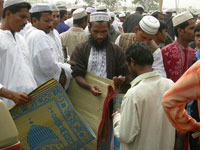 A rug-seller relishes the business opportunity of a lifetime
A rug-seller relishes the business opportunity of a lifetime
The first to invite me into their quarters was a group of tall men with bulgy turbans from North Waziristan, one of the tribal areas in Pakistan where the Taliban have taken over. We drank two rounds of milky tea and discussed, in Urdu, the Taliban and the changes they've brought to North Waziristan. "The law and order is much better," one said. "But it's very dangerous for someone like you." After a few minutes, the leader was fetched. This must be King Missionary, I thought, the moment he arrived. As he circled his quarry, he cracked his knuckles and rolled his neck like a boxer in warm-up before he sat and faced me. He had no sooner begun imploring me to "come to Allah" when an exterminator entered the barn, wielding what looked like a military-grade leaf-blower. The bug man sprayed a lethal poison—only for mosquitoes, he assured us—that shrouded our circle in a cloud of toxic fumes. Taking advantage of the smokescreen, I ducked away.
After stumbling out of the Pakistani tent, coughing and holding my shirt over my mouth, a teenage Bangladeshi boy stopped me and flashed a creepy smile. He tenderly rubbed my chin and repeated, in a breathy voice, "Oh, oh, Allah." After this, I resolved to find the American tent, where I might have fewer problems with cultural nuances.
There I met Abdul Badi, the artist from Boston. Badi, who converted to Islam "back in the '60s," traveled with his teenage son. Both father and son wore full beards and shaved their upper lips in the tradition of the Prophet Mohammed. They acted and sounded, well, American. Undoubtedly, they had pitched the nicest tent on the premises. "Yup," Badi said while slowly nodding and admiring the blue-and-white, eight-man model. "We brought the Coleman," decisively accenting the first syllable of KOHL-man to emphasize that it was a cool thing. As we talked, a bottle of perfume was passed around, which the tablighis dabbed on their neck and wrists. Sensing my apprehension, Badi suggested: "Smell it first. It isn't for everyone." Grateful for his intercession, I passed the bottle to my left.
Later, I asked Badi what compelled his conversion to Islam and decision to join Tablighi Jamaat. During the 1960s, he said with a cocksure grin, "I was a faithful worshipper of earthly beauty. But I reached a plateau of consciousness." He searched for some spiritual calling. Eventually he found it in a stethoscope. "People say if you listen to your heartbeat, it makes the sound, 'LOVE, dove,' 'LOVE, dove.' One day, I took a stethoscope and placed it on my heart. You know what it said? 'AL-lah, AL-lah.' You don't need to formally convert if you can hear the sound of your own heart."
When the evening's last sermon ended at around 10, I joined Badi, Eisa, and another African-American—a real-life boxing coach from New York City—for dinner. We sat on the ground and plunged our hands into mounds of rice, meat, and salad. The coach asked if I was a new convert. When I replied that I was just a journalist, he pushed out his lips, as if he were trying to hold a pencil in place with his upper lip. "But I can tell your heart is getting softer and softer," he said in a gravelly voice while holding out his upturned palm and opening and closing it as if he were kneading dough. Meanwhile, Eisa lectured on how I couldn't fully understand Islam without becoming a Muslim. When he noticed me trying to break the conversation by looking around, he snapped: "Listen! I am not talking to hear myself. If you are going to quote me in your article, you better be listening to everything that I say." I smiled nervously, somewhat embarrassed, and grabbed another fistful of rice.
The rest of dinner continued with various American Muslims working their own missionary angle. Between the coach kneading, Eisa demanding my attention, and the spicy food, my face broke out in a heavy sweat. Just in the nick of time, my friend called to say that he was heading back to Dhaka for the night. I had an excuse, and I stood up to leave. Abdul Badi got up to walk me to the gate. "This must be an overwhelming experience for you," he said along the way. "I think you need a full-on Arabian experience," Badi added, alluding to Mecca, where only Muslims are allowed.
I saw what he was getting at. And with one last nervous smile, I bade him farewell and stepped out into the night.
Who'd Be an Untouchable?
Posted Thursday, April 19, 2007, at 7:22 AM ET
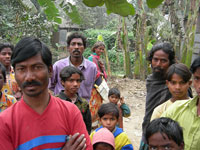 The village of Gosaipur
The village of Gosaipur
The people of Gosaipur, a village in northwestern Bangladesh just outside the city of Dinajpur, regard Khokan as their finest hunter. Yet in his turquoise loongi, a traditional Bangladeshi man-skirt, and navy blue T-shirt with a screen-printed portrait of a female Bengali film star, he didn't strike me as a fearsome figure. But the skills needed for hunting turtles and kuchia, a species of eel that lives in the swamp, don't require bravado or great strength. "You need to be quick," Khokan said, describing his technique for catching kuchia with his hands. "You watch for the fin print in the mud, and then you pounce." And the turtles? He shrugged, feigned nonchalance, and added, "I just chase them down and stick a spear through their shell."
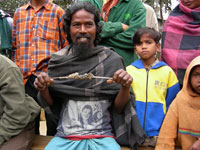 Khokan with barbecued kuchia, or eel
Khokan with barbecued kuchia, or eel
Khokan belongs to a caste of Hindus known as "Mushaheris," a Sanskrit word meaning mice-eaters. The Mushaheris are Dalits, the lowest of the low, according to the Hindu caste system. They were known as untouchables before the Indian subcontinent became politically correct. Some say that if so much as the shadow of a Dalit touches a person from an upper caste, the aristocrat should bathe thoroughly to cleanse any impurities. Dalits, numbering about 1 million in Bangladesh (and well over 100 million in Hindu-majority India), are socially immobile. Potential employers shy away from hiring someone labeled an untouchable by their co-religionists. Men and women are usually left toiling as brick-breakers. Yet the wages from breaking bricks are meager—around 70 cents a day—and not enough to buy meat. To compensate for protein deficiencies, Dalits hunt and eat anything they can find. Mice are the most common, thus the name "mice-eaters." But mouse season recently ended, Khokan said. Kuchia were abundant. He ran off to retrieve the spoils of yesterday's hunt: two barbequed eel heads, skewered on a knobby twig.
After showing me his tools for breaking bricks and spearing turtles, Khokan offered a tour of the village. A distinct smell of urine wafted through the air. In one corner, the village pig rolled in dirt while a cow on a short leash circled around a pole. Both animals, Khokan explained, are investments for a rainy day; a Christian village will buy the pig for about $100 next Christmas, and the cow could fetch several hundred dollars.
Gosaipur's main attraction is a soccer-goal-sized temple dedicated to Shiva, the Hindu god of creation and destruction. Apparently, Shiva liked to get stoned, and so, to fully show his veneration, Khokan smoked a lot of pot. He pulled a hash-packed chillum, a pipe traditionally used by Hindu mystics to smoke hashish, from his pocket and suggested we light up. I declined as diplomatically as possible, not wanting him to think my refusal reflected bias against sharing a pipe with an untouchable. "It's only 9 in the morning," I said. "And I still have a day's worth of meetings to attend." Picturing an afternoon of the munchies with the eel heads was enough to make anyone decline the invitation.
After saying farewell to Khokan and leaving Gosaipur, I learned that Muslims inhabit the neighboring village. Bangladesh is a Muslim-majority country, but about 10 percent to 12 percent of the population of around 145 million is Hindu. Bangladeshis boast that their vibrant, liberal culture is a product of Hindus and Muslims living side by side for centuries. Rabindranath Tagore, a Bengali poet, artist, and novelist who won the Nobel Prize for literature in 1913 and is hailed as Bangladesh's Shakespeare, was a Hindu. Two of Tagore's poems would later be adopted as national anthems by both India and Bangladesh.
Still, there are others who think that the rise of Islamist groups in Bangladesh poses a threat to the Hindu minority, especially the outcast Mushaheris. "Jamaat-i-Islami has taken advantage of their weaknesses," said Shah Mobin Jinnah, director of the Community Development Association, an NGO based in Dinajpur. Jinnah believes that the Islamists are using the Mushaheris' illiteracy and destitute poverty to encourage conversions. Can you blame them? I asked Jinnah. Wouldn't you consider converting to another religion if the one you belonged to classified you as untouchable? It's been done before. On Aug. 14, 1956, B.R. Ambedkar, a primary author of India's constitution and a Dalit by birth, converted himself—and 380,000 other untouchables—to Buddhism.
After my meeting with Jinnah, I headed to another Mushaheri village about 30 miles outside Dinajpur. The company that normally runs buses between the main road and the village had, for unknown reasons, scrapped their service for the day, so we rented a "van." I'm unsure how a bicycle pulling a flatbed with two wheels and a lantern dangling underneath was ever dubbed a van, but a friend and I loaded onto the back of it, held the sides so as not to slide off, and went bumping along. After a chilly, 45-minute bike ride on a two-lane road that meandered through rice paddies, we arrived in the second village, Subarna Khuli, or "golden field," at dusk. Three kids played catch with a ball of tape. Across the village, one family performed mundan, a Hindu ritual in which the male child's first haircut involves shaving the boy's head. Fellow villagers gathered to celebrate, and the family distributed handfuls of rice wrapped in banana leaves. The village had toilets and a schoolhouse. A few people even had jobs.
A short, thin man named Donasher introduced himself as a rice farmer. He had just finished a day's work, standing knee-deep in grimy water planting rice. A frequent and violent cough sounded like someone was beating him on the back with a 2-by-4. Soon enough, Donasher said, the rice season would end and he'd have no work. "How do you make your earnings last through the year?" I asked. "We can't," he said. During other "off seasons" he hunted and ate mice. But lately, Donasher hasn't needed to go out hunting. About two years ago, village life improved dramatically when everyone converted—to Christianity.
Donasher recalled how two teams of missionaries, one from the Bangladesh Lutheran Church and another from Thali Ta Khumi Church, entered Subarna Khuli and told the village elders: "We will look after you." They immediately built a church. They followed that with a school, where the children receive one meal a day. "They have given us winter clothes, and in workless times, they have given us money," Donasher said. Before long, responding to the churches' persistent requests, government engineers installed a tube well to pump safe drinking water. "They have helped us both spiritually and economically," he said.
I thought back on what Shah Mobin Jinnah had told me earlier in the day. And he was right: The Mushaheris are a vulnerable lot. Their own religion doesn't seem to want them, so why should they feel compelled to stay Hindu forever? More than that, however, the story of Subarna Khuli illustrates how religious conversions take place. There are plenty of stories about domineering missionaries using force or manipulative tactics to convert. But often, it is just a matter of satisfying people's basic needs. Christian, Muslim, or Buddhist—whichever missionaries can improve the lives of people like Donasher will ultimately win their allegiance.
Nevertheless, neither church has delivered electricity to Subarna Khuli yet. An hour after we arrived, the sky fell pitch black, and Donasher ran off to get a bottle of molasses moonshine. Four of us sat on the floor of his single-room home and passed around the bottle, using the light of my cell phone to find one another's hand. I took one gulp that immediately sent a burning sensation down to my toes. After another swig, we boarded the van and, holding tight, meandered back through the rice paddies.
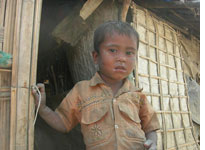
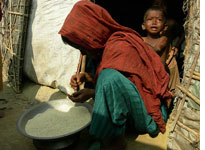
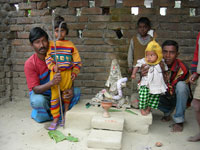
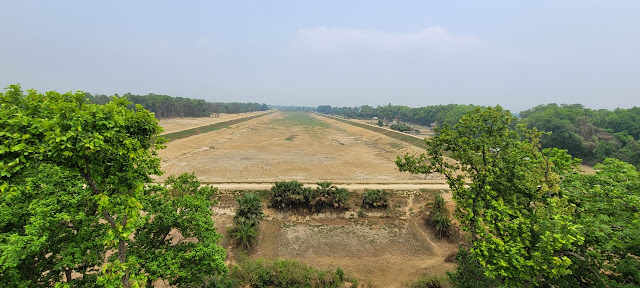

Comments
Post a Comment